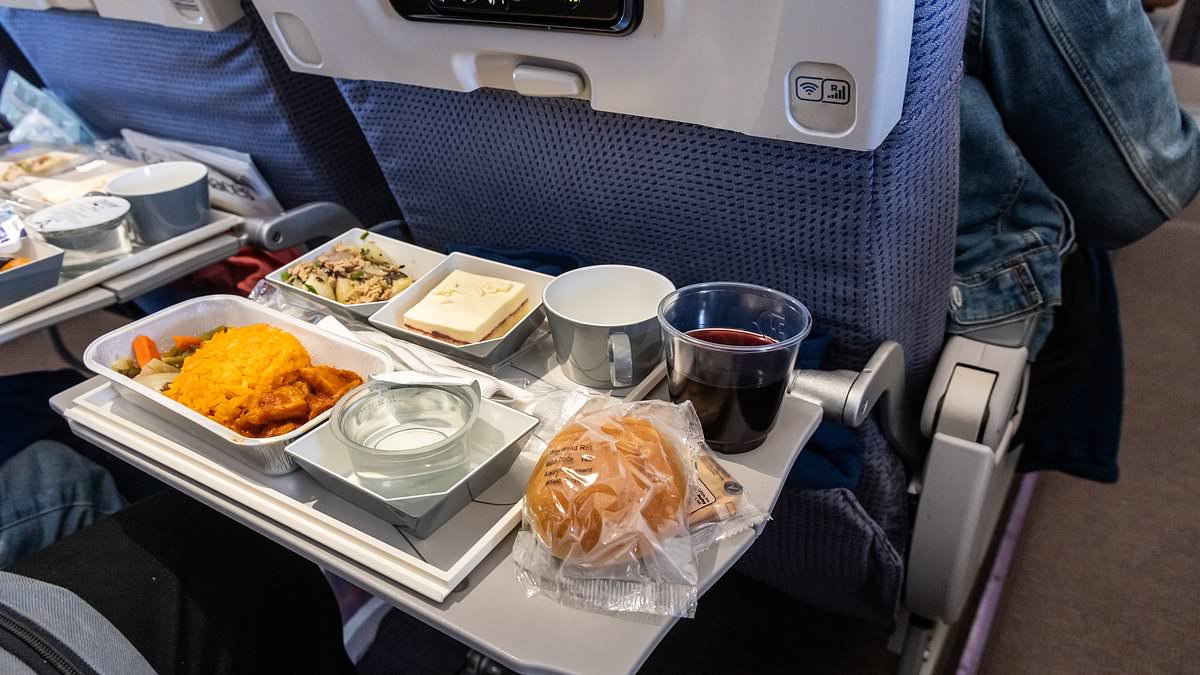Many travelers have a love-hate relationship with airplane food.
But one fitness and nutrition expert says he would never eat while flying – even when traveling in first class with restaurant-worthy dishes.
Speaking on a recent podcast, Michael Sheedy, 31, warned the cabin pressure and elevation makes it harder for food to move through the body.
This change in air pressure, along with the motion of the plane, means that digested food can’t move efficiently to the small intestine. This can cause stomach pain, bloating, gas and make it more difficult to do a number two.
For this reason, passengers with IBS might find their symptoms flare up.
Backing up his claims, New York-based gastroenterologist Dr Elena Ivanina, told to DailyMail.com that ‘jet belly is indeed a real phenomenon’ and it is better not to eat while in the air.

Michael Sheedy, 31, a business and fitness coach based in Las Vegas, never touches food on planes as it could cause gastrointestinal inflammation
She explains: ‘Not only does travelling and associated time changes, impaired sleep and altered eating schedules and food choices disrupt digestion – but the actual act of flying changes digestion as well due to the cabin pressure.
‘Gas in the gut may expand when air pressure decreases at higher altitudes and can feel like bloating, distention and urgency to pass gas.
‘In fact, studies have shown that in astronauts going into space, they had an abnormal decrease in stomach motility after eating on the first few days of space flight.’
Being inactive for long periods of time in a confined space can also contribute to gassiness, along with making it harder for digested food to move to the small intestine.
Therefore, Dr Ivanina says it is best to eat before and after flying if possible.
This especially applies to passengers with preexisting digestive issues, such as Crohn’s disease and ulcerative colitis, as eating in the air can add to their discomfort.
This is because slower digestion and constipation are more likely in the pressurized environment.

New York-based gastroenterologist Dr Elena Ivanina says it is best to eat before and after flying if possible
And in terms of drinks, Dr Ivanina advises staying clear of alcohol and carbonated drinks and sticking to ‘non-carbonated gentle water and teas.’
Fitness influencer Mr Sheedy does exactly this. He revealed his flying rituals on the Wealthy Way podcast.
‘So when you eat on an airplane, your food doesn’t digest as well, and it could cause gastrointestinal inflammation.
‘So what I do every time I’m flying, even if it’s an earlier flight, I will wake up, I won’t eat.
‘I’ll just do coffee, water, and electrolytes on the plane.
‘[Even in] first class I’m saying no to the meal. Typically [the food] is not great either way.’
Even at the airport, Mr Sheedy says it is ‘hard’ to find healthy food, so he chooses to fast throughout his voyage until he reaches his final destination and he can finally have a meal.
He concludes: ‘You know, not only does that keep my body composition looking good, I feel better.
‘And when I land, I can eat whatever I want.’
To avoid gas and bloating Turkish Airlines also advises passengers to go to the bathroom before boarding a flight and on long-haul, to walk around the cabin every two hours.
And if you do decide to eat during a flight, the airline recommends doing so ‘slowly,’ as ‘air enters the digestive system every time you swallow… swallowing too much air can cause bloating.’









